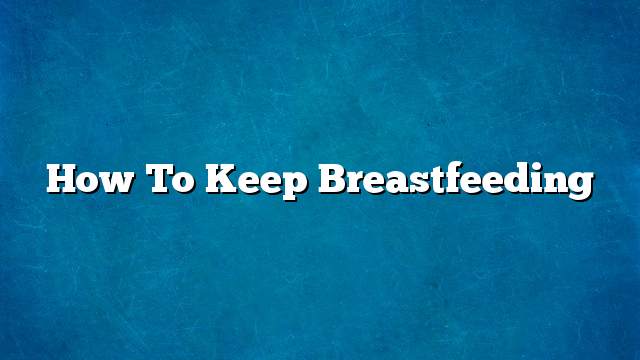Ways to maintain breastfeeding
- Mother’s nutrition: Good mother nutrition will improve and increase breastfeeding.
- Relaxation: You must find a quiet place to relax, massage your breast, or use warm compresses to get milk; because stress hampers the process of breast excretion of milk.
- Drinking liquids: Drink plenty of liquids; to maintain body moisture, and to reduce the drinks that contain caffeine, such as coffee, so as not to affect the sleep of the child.
- Stay away from smoking: As smoking reduces the secretion of milk, and change the taste, it is worth mentioning that smoking increases the risk of sudden infant death syndrome, and increase the incidence of respiratory diseases.
Nutrition tips for lactating women
The nutrition requirements for breastfeeding are similar to those for pregnancy, and women who continue to eat in a similar way to how to eat during pregnancy, yet the breastfeeding woman needs an additional 200 calories per day than during pregnancy, and it is important to get calories Of nutritious foods, women usually lose when they naturally breastfeed from 0.4 to 1.8 kg without calorie restriction, and the food should include pregnant women:
Protein
During breastfeeding, women should eat 2-3 servings of protein daily, equal to 84 to 112 grams of meat, fish or poultry, and good sources of protein: meat, poultry, seafood, eggs, cheese, milk , Yogurt, cheese, tofu, dried beans, FDA recommends nursing mothers to not eat shark, swordfish, mackerel, or tilapia; due to high mercury content.
Calcium
The recommended daily amount of calcium for lactating mothers is 1,300 milligrams per day. Examples of calcium-rich foods include milk, yogurt, cheese and orange juice.
Iron
Iron is a very important element for breastfeeding mothers. Women 18 years of age or younger must get 10 milligrams of iron per day. For those over the age of 19, the recommended daily intake is 9 milligrams. Good sources of iron include meat, Poultry, seafood, dried beans, dried fruits, egg yolks.
Vitamins and minerals
Lactating mothers need to take daily vitamins. Pregnant women can continue to take the same prenatal vitamins or mineral supplements, but attention must be paid to them, because dietary supplements contain iron more than is required for breastfeeding.
Vitamin C
Lactating mothers need a slightly larger vitamin C supplement than they did during pregnancy. If a woman is 18 or younger, you should get 115 milligrams of vitamin C daily, while those over the age of 19 need to They get 120 milligrams a day. Good sources of vitamin C include citrus, broccoli, melons, potatoes, paprika, tomatoes, kiwi, cauliflower, and cabbage.
Liquids
Drink at least 8 glasses of water daily during breastfeeding, in addition to drinking other good liquids such as natural juice, milk, broth, tea, and soup.
Foods and drinks should be avoided during breastfeeding
Most seafood, such as shark, swordfish, mackerel, or tile thickness, should be restricted because of high mercury content. Exposure to excess amounts of mercury through breast milk can pose a risk to the growth of the nervous system, Caffeine in breast milk may increase the child’s movement and avoid sleep, so you should avoid drinking more than 2 to 3 cups, avoid drinking alcohol, smoking cigarettes, and medicines not approved by your health care provider. Its own.
